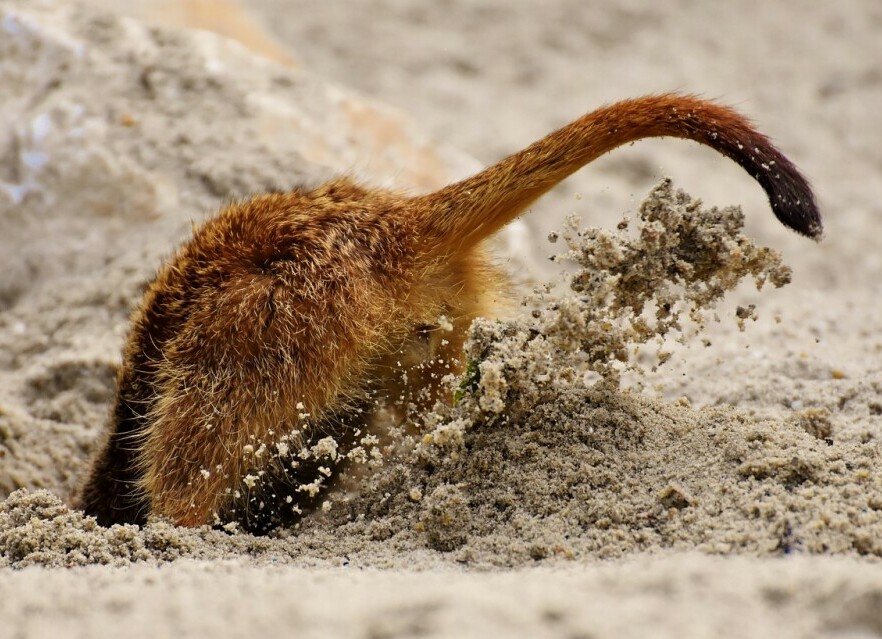
A few of the links in this post are affiliate links. If you buy something, we may earn a small commission (no extra bones from your wallet 🐾). Thanks for helping support the site and all of the dog adventures!
If you’ve caught your dog treating your garden like their personal archaeological site, you’re not alone. Many pet owners experience the frustration of finding new, unwanted holes in their yard. But before you can effectively stop this behavior, you need to grasp the root causes of why dogs dig. This is why we stepped in to deliver this article to teach you how to stop your dog from digging holes in your yard.
It’s useful to remember that digging is a NATURAL and common dog behavior. For some breeds, like terriers and dachshunds, it’s practically in their DNA, hardwired from generations bred for activities like hunting burrowing animals. But there isn’t a one-size-fits-all explanation; each dog has their own unique reasons and triggers.
Maybe your four-legged friend is seeking relief from the heat, and that hole is their cool refuge, or perhaps they smell the intriguing scents of critters and can’t resist the urge to investigate. It’s also possible they’re simply stashing away a favorite toy for safekeeping.
Notwithstanding the inherent digging inclinations, there’s a spectrum of reasons that range from boredom to anxiety, and understanding these motives is CRUCIAL. By keeping an eye out for when and where your dog digs, you can learn a lot about what’s driving their behavior.
This groundwork gives you the insight needed to redirect their natural instincts in a way that saves your lawn from looking like a moonscape.
Digging is one of the most common behavior issues. Learn effective solutions in Common Dog Behavior Problems and How to Fix Them.
Looking for fresh dog food delivered? Click here.

Decoding the Dig: Insights Into the Canine Mind
If we’ve learned anything from our experience with dogs, it’s that each dog’s digging comes with a story. To curtail this, you have to tap into their canine mind. It’s not just about the holes in the yard; it’s about what’s going on inside their head. You need to understand that there is a root cause beneath the digging that you need to find.
Take boredom, for instance. A bored dog is an excavator waiting to happen. Dogs need stimulation, and when they don’t get it, they turn the earth into their playground. It’s their way of saying, ‘I need more to do!’ This is probably the most common reason that dogs dig.
We all have busy lives, but your dog needs some action. If left alone for most of the day without any real excitement, its frustration may come out in strange ways, one of them being digging.
If your dog is digging in your yard, ask yourself if you have gotten them out to expend some of its pent up energy. If you take the time to play with your dog and get them to run around and wear themselves out, then they may be too tired to damage your yard.
Then there are the attention-seekers. Some dogs quickly learn that digging a hole is a one-way ticket to their owner’s attention, even if it’s not the positive kind. They crave interaction and digging becomes their mischievous way of getting it. This can be tricky because if you aren’t careful you may be giving them exactly what you want.
The important thing to remember is that your dog just wants love and affection, so if it’s acting out and you want to know why, then maybe question whether you have paid enough attention to your dog. Have you been showing them enough love?
Make sure to show them praise when they are being good and make a physical connection with your pup. Give them a pat or even a hug so that they know they are loved and taken care of. If they get the attention they crave in ways other than yelling at them for digging holes, they may not feel the need to get your attention in such negative ways.
For our furry friends, digging can also be a default behavior, thanks to their genes. Certain breeds, like terriers and hounds, have digging in their DNA. It’s a trait passed down from ancestors who dug for prey or to create dens for shelter. This can make for a tough situation as it may be hard to get your dog to go against its natural instincts.
We’ve also seen dogs dig to deal with anxiety. When they feel nervous or upset, digging can be a coping mechanism, a way to find comfort and security. Understanding this emotional aspect is crucial to providing the right support and solutions. If your dog is anxious, you may need to address the root of this anxiousness in order to get your dog to stop their digging.
Remember, it’s ESSENTIAL to recognize and address the underlying reasons for digging before jumping into corrective measures. That’s how we prepare for the next step: implementing specific strategies to redirect the digging behavior to more appropriate outlets. We are going to go over the best ways to stop this dirty habit.
Preventing digging starts with a safe, controlled environment. Get tips in Dog-Proofing Your Home and Yard.

Dig This, Not That: Redirecting Your Dog’s Digging Desire
The key to keeping your yard intact is to channel your dog’s digging energy into more appropriate activities. Think of it as redirecting a natural behavior rather than trying to suppress it entirely. Here’s how to steer your dog away from those garden excavations.
Training can play a pivotal role. Start with clear and consistent commands whenever your dog begins to dig in an off-limits zone. Distraction can also be effective, offering a toy or initiating play as soon as the paws start to paddle.
Dogs are creatures of habit. You can use this to your advantage by creating a designated area in the yard for digging. Fill a sandbox with loose soil or sand, and encourage your dog to dig there by burying toys or treats for them to discover.
Exercise and mental engagement are critical. Ensuring your dog has plenty of both can decrease the need for self-stimulation through digging. Regular walks, play sessions, and training exercises can go a long way to reduce those yard craters.
Adequate exercise isn’t just about the amount, but also the quality. Engage in activities that satisfy your dog’s breed-specific instincts. For example, scent hounds may benefit from games that involve tracking scents, whereas terriers may enjoy simulated ‘vermin hunting’ games.
Boredom often triggers digging. Redirect energy with The Best Interactive Dog Toys to Keep Your Dog Busy.

Conclusion: Embracing the Paws-itive Side
In concluding our discussion on how to prevent our furry friends from turning the backyard into a minefield of holes, it’s important to remember the delicate balance between a dog’s natural behaviors and your aspirations for a pristine lawn.
Admittedly, witnessing the aftermath of a digging spree can be frustrating. Yet, with patience and the right strategies, it’s possible to guide your dog away from this destructive path without dampening their spirit.
For those situations where the shovel seems mightier than the training, it could be wise to consult a professional dog trainer or a behaviorist. They offer specialized insight that can turn a hole crisis into manageable mischief.
Finally, maintaining a beautiful yard that’s also a happy place for your dog is an attainable goal. Regularly reassess the effectiveness of your strategies and remain open to adjustments. With time and effort, both you and your dog can enjoy the yard in harmony.
Puppies dig more than adults. Early training strategies are explained in Ultimate Puppy Training Guide.
Looking for fresh dog food delivered? Click here.

